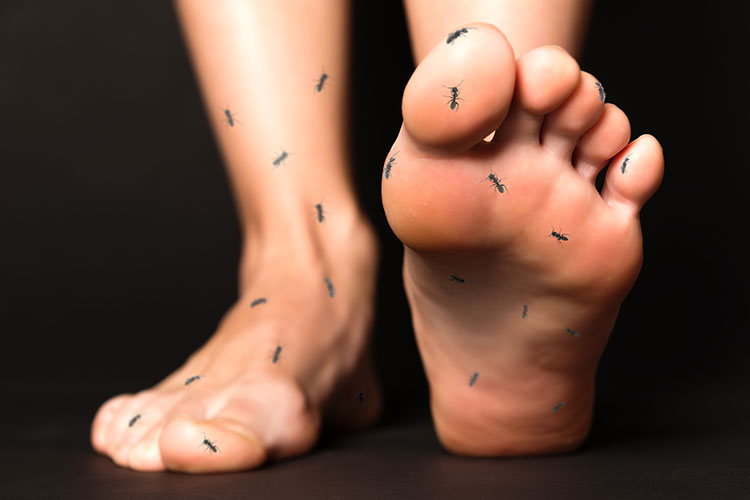If you’re experiencing any of these symptoms, call Well Being Neuropathy Relief Center in Roseville at (916) 945-9800 for long-lasting neuropathy pain relief solutions. We offer different nonsurgical procedures that target the direct cause of your symptoms, and we’ve helped many patients experiencing neuropathic pain find relief. Call us to schedule a consultation and get back to living pain-free today.
Peripheral neuropathy can develop from a few different causes. Below are the most common causes of the condition.
Diabetes
About 60% of diabetics will eventually experience some form of nerve damage throughout their life. Nerve damage can be caused by consistently high blood sugar levels and high blood pressure. Although symptoms may take years to appear, with most people usually experiencing symptoms closer to mid-life, patients diagnosed with diabetes should manage their blood sugar levels to prevent peripheral neuropathy from developing early or progressing too quickly.
Alcoholism
Alcoholic neuropathy can develop from consuming excess amounts of alcohol over a long period of time. When you drink large amounts of alcohol, ethanol and other toxins are delivered to your nerves in place of essential vitamins and nutrients. These toxins damage your nerves. Early symptoms of alcoholic neuropathy include burning and tingling sensations in your hands and feet.
If you believe you’re suffering from alcoholic neuropathy, call us at (916) 945-9800 to discuss possible treatment plans for you and your condition.
Hereditary Neuropathy
Neuropathy can also develop from a hereditary disorder. There are a few types of hereditary neuropathic disorders, but the most commonly diagnosed is Charcot Marie Tooth Disease (CMT). CMT is a degenerative disease of the nerves and muscles in your lower leg, foot, forearm, and hands. The disease is slowly progressive and can eventually limit the functionality of your hands and feet, as well as produce a loss of sensation in your limbs and physical abnormalities to your feet.
Call our Roseville office at (916) 945-9800 to find out which of our services is right for you and your symptoms.
Kidney Failure
Your kidneys are responsible for filtering out toxic fluids and waste accumulating throughout your body. Blood vessels within the kidney filter the waste, but high blood sugar levels can destroy those blood vessels and your kidneys would not function properly. Toxins left in your body can damage your nerves, and without properly functioning kidneys, your body cannot regulate blood sugar levels. This can lead to peripheral neuropathy, although symptoms of kidney damage may be hard to detect. We recommend regular testing to detect any abnormalities that could lead to kidney failure.
At Well Being Neuropathy Relief Center in Roseville, we’ve successfully treated symptoms of peripheral neuropathy and we’re dedicated to helping you get back to enjoying everyday life pain free. If pain from peripheral neuropathy is affecting you or someone you know, call our office in Roseville at (916) 945-9800 to schedule a consultation with one of our doctors.
Call Well Being Neuropathy Relief Center in Roseville at (916) 945-9800 to schedule an appointment today!
If you have developed peripheral neuropathy from diabetes and are becoming depressed as a result, we may have a solution for you. Contact Well Being Neuropathy Relief Center today at (916) 945-9800 to schedule a free consultation. Don’t wait! The sooner you can treat peripheral neuropathy; the sooner you will feel better. Call (916) 945-9800 now!

